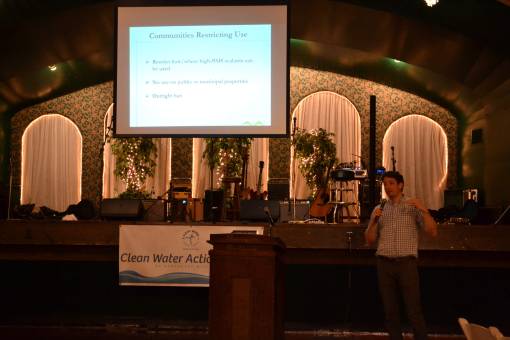By Dana La Verne
The humanities explore the human experience, and one way to do this is interning with a non-profit organization. This semester I have been completing my humanities degree by interning with Clean Water Action Council of Northeast Wisconsin (CWAC). CWAC is a non-profit dedicated to promoting a safe, healthy, and sustainable environment for the region. Throughout this internship I have gained a positive experience in helping humans and the environment stay healthy.

I have had many opportunities through this internship. I was able to talk to the local Green Bay community about CWAC at the Winter Farmers Market. The community is what allows us to be able to continue doing our work. I was also able to attend the Making the Connection Conference in Madison, WI which discussed environmental health in our society. I was able to listen to doctors and every day individuals discuss the work they do in society to help us live the healthiest lives possible.

With this internship I also learned about managing a non-profit organization. I am the manager of the weekly update. This is an update we email to our members and email list with events, actions, new legal permits, and important environmental news that is happening in Northeast Wisconsin and around the world. I am also in charge of social media. I post everything from the weekly update, and anything that I find useful that the public should know about. CWAC also has a quarterly newsletter that we publish. For the Spring 2019 Newsletter I published an article called “Electric Vehicles Making a Positive Impact Toward Global Warming”, which discussed that electric vehicles will be a healthy form of transportation for humans and for the environment.
The Clean Water Action Council also hosts many events such as health forums to help keep the public informed. This includes keeping up with research, and what the public is interested in learning. The health forum I helped promote was “The Environment and Health: Why what we eat, touch, and breathe matters.” One major project we are working on with a sister non-profit, Clean Wisconsin, is discussing the dangers of Coal Tar Sealants. In the tar sealants are Polycyclic Aromatic Hydrocarbons, or PAHs. They are found in parking lots and driveways which pose a threat to anyone, but especially the sick, elderly, and our children who play on these surfaces. We have hosted three presentations in Brown, Oconto and Marinette Counties, sent emails and letters to schools, hospitals, and public officials in the counties, cities, villages, and towns, and advertised throughout the communities. Legislation has been passed in neighboring areas to help raise awareness, which we now want to do in Northeast Wisconsin.
“Interning for a non-profit organization allows you the ability to experience humanities from a different perspective.”
Dana La Verne
Another important aspect with working with a non-profit organization is learning how to fundraise, either through the organization or through grants. For instance, we received a grant for the Coal Tar Sealants. We sell merchandise such as bags, t-shirts, and sweatshirts, but our biggest fundraiser is our annual banquet. I had to contact local businesses for donations to our silent auction, advertise the event, sell tickets, and help with the planning process. Our banquet included a social, silent auction, dinner, program, and dance. This year the meal was slow roasted free-range chicken which was gluten-free or mushroom Marinara, which was vegan and also gluten-free. You also got a mixed green salad, roasted sweet potatoes, vegetables, and a dessert bar. Our food was locally sourced. If you didn’t find something you liked to eat, there was no hope. The program included speaker Paul Matheson from Clean Wisconsin discussing protecting our families from toxic pavement sealants, and the band was Terry Murphy and the Cherry Pickers. It was a fun time promoting CWAC and the work that we do, but it was also a lot of work. The greatest thing I enjoyed was seeing everything come together.

Photo Credit: Intern Lauren Felder

Photo Credit: Kayla Carolyn Photography
Interning for Clean Water Action Council of Northeast Wisconsin gave me a well-rounded experience. I learned how to manage a non-profit through the wonderful guidance of President and Director Dean Hoegger, I organized events, managed the weekly newsletter and social media, wrote a published article, and I went out of my comfort zone with fundraising by calling businesses. I also gained important relationships with the other interns, Lauren Felder and Jace Hannemann, and interim manager Caitlin Cravillion. We helped each other when needed, supported each other on difficult days, and became wonderful friends. This internship helped me gain professional experience that I can use in my future careers and endeavors, and it helped me build long lasting relationships.
I hope this blog post makes you realize that humanities can be more than interning at museums or historical societies. It is also about learning about humanity today. I gained that experience by interning at CWAC. You can gain that experience by working at any non-profit you could imagine. It doesn’t even have to be a non-profit. You take out what you want from your participation in an internship.
“This internship and everything I learned along the way will stick with me for the rest of my life. “
Dana La Verne
I would like to end by saying thank you to the University of Wisconsin – Green Bay, the humanities department, and especially Clean Water Action Council of Northeast Wisconsin for giving me this opportunity and professional experience. I hope to take everything I learned and the portfolio I built throughout the semester to continue impacting humanity and society in a positive way.